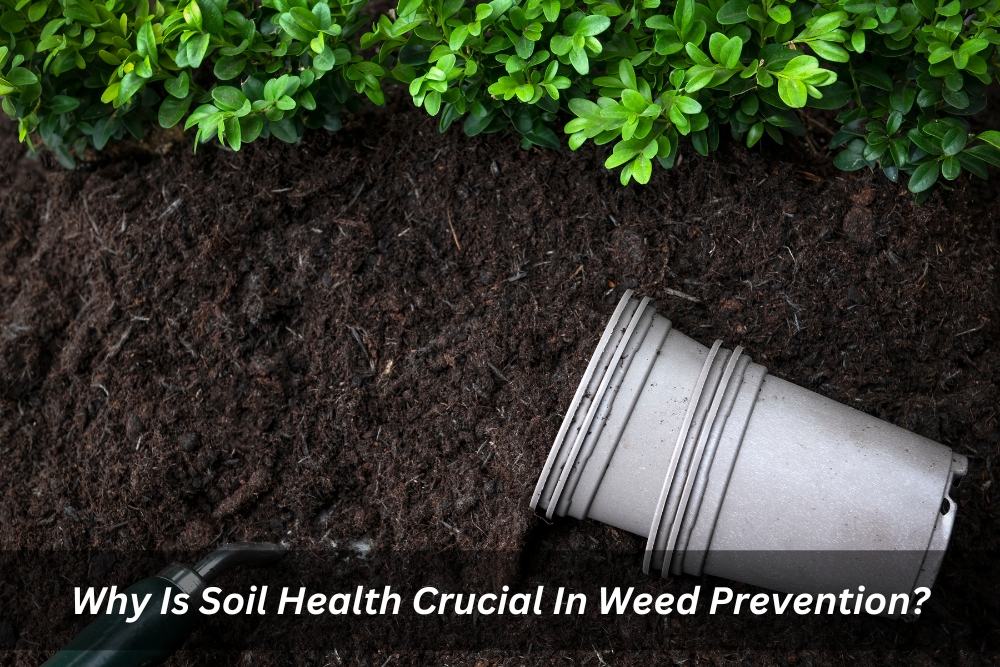Weeds, those tenacious and unwelcome plants that frequently appear seemingly overnight, can pose a significant challenge for any gardener. They vie for resources, overshadow desirable plants, and result in unsightly landscapes. While there are diverse methods for weed prevention, preserving healthy soil stands out as a fundamental and highly effective approach to curb their growth. In this article, we will delve into the significance of soil health in weed prevention and offer practical tips for cultivating your soil to naturally deter weeds.
What is soil health?
Soil health, also known as soil quality or soil fertility, refers to the overall condition of the soil in your garden or agricultural area. Healthy soil is teeming with life, including beneficial microorganisms, earthworms, and other soil fauna, which play crucial roles in nutrient cycling and soil structure.
Why is maintaining soil health essential for suppressing weed growth?
Soil health is essential for suppressing weed growth because it creates an environment where your desired plants can thrive, leaving little room for weeds to establish themselves. Here are some key reasons why maintaining soil health is crucial:
- Reduced weed seed germination: Healthy soil typically has a robust and diverse ecosystem of microorganisms that break down organic matter. This process can include the degradation of weed seeds, reducing the number of viable seeds in the soil and curbing weed germination.
- Competition for resources: Healthy soil provides a wealth of nutrients and water for your chosen plants. With strong competition from your preferred plants, weeds struggle to access the resources they need to grow.
- Physical barriers: Healthy soil often has a well-developed structure that makes it challenging for weed seeds to penetrate and establish themselves. This structure can include a crumbly, friable texture that is less conducive to weed root growth.
- Biological control: Beneficial insects and other organisms that inhabit healthy soil can help control weed populations. Predatory insects and nematodes can feed on weed seeds and seedlings, keeping their numbers in check.
- Disease resistance: Soil health supports plant vitality and resilience. Strong, healthy plants are less susceptible to diseases, reducing the need for chemical interventions that might harm beneficial soil organisms.
How does soil health contribute to weed prevention?
Now, you might be wondering how soil health and weed prevention are connected. It all comes down to competition. Weeds thrive in disturbed or degraded soils, and they are quick to take advantage of any available resources. When your soil is unhealthy, it becomes an open invitation for weeds to invade. Here’s how soil health contributes to weed prevention:
- Resource competition: Healthy soil supports the growth of your desired plants by providing them with ample nutrients and moisture. With these resources in abundance, your chosen plants can grow vigorously, leaving less space and fewer resources for weeds to exploit.
- Strong plant growth: When your plants are robust and vigorous, they can crowd out weeds. They create a dense canopy that makes it difficult for weed seeds to find a suitable spot to germinate and grow.
- Soil microorganisms: Beneficial microorganisms in healthy soil can outcompete weed seeds for resources, effectively suppressing weed growth. These microorganisms also break down organic matter, releasing nutrients for your plants and further depriving weeds of their needed nourishment.
- Soil structure: Well-structured soil allows plant roots to explore a larger volume of soil, increasing their access to nutrients and water. This advantage helps your plants thrive, while weeds, with shallower roots, struggle to compete.
- Allelopathy: Some plants naturally produce chemicals that inhibit the growth of other plants, a phenomenon known as allelopathy. Healthy soil can foster plants with allelopathic properties, reducing weed competition.
What are some natural weed prevention methods that utilise healthy soil practices?
While maintaining soil health is a key aspect of weed prevention, there are also natural and sustainable methods that leverage healthy soil practices. These methods can further enhance your weed control efforts while keeping your garden eco-friendly:
- Mulching: Applying organic mulch, such as wood chips, straw, or compost, to the soil surface helps suppress weed growth by blocking sunlight and preventing weed seeds from germinating.
- Companion planting: Some plants have natural weed-suppressing qualities and can be used as companions for your main crops. For example, marigolds release allelopathic chemicals that deter certain weeds.
- Crop rotation: Rotating your crops from one year to the next can help disrupt the life cycles of weed species and reduce their prevalence. It also maintains soil health by preventing nutrient depletion.
- Cover crops: Planting cover crops during the off-season can improve soil health and prevent weeds from taking hold. Cover crops like clover or rye can smother weeds with their vigorous growth.
- Weed barriers: Landscape fabrics or biodegradable mulch films can be used as physical barriers to prevent weed growth. These can be especially useful in areas where you plan to grow specific crops.
- Intensive planting: Planting your crops closer together can create a dense canopy, reducing space for weeds to grow. This method is often referred to as square-foot gardening.
Practical tips for maintaining healthy soil and preventing weeds
Now that you understand the importance of soil health in preventing weed growth and some natural weed control methods, let’s delve into practical tips for maintaining healthy soil. By implementing these strategies, you can create an environment that naturally discourages weed growth:
- Soil testing: Start by testing your soil to determine its nutrient levels and pH. This information will guide your fertilisation and amendment efforts to ensure your plants receive the nutrients they need without overloading the soil.
- Compost and organic matter: Regularly add compost and organic matter to your soil. This improves soil structure, enhances nutrient retention, and encourages beneficial microorganisms.
- Proper irrigation: Water your garden or field efficiently, avoiding over- or under-irrigation. Overly wet soil can lead to weed problems while underwatering can stress your plants.
- Weed removal: Regularly remove weeds when they are small and before they have a chance to produce seeds. This prevents them from adding to the weed seed bank in your soil.
- Crop selection: Choose plant varieties that are well-suited to your climate and soil conditions. Healthy plants are more competitive against weeds.
- Minimise soil disturbance: Try to minimise soil disturbance, especially in established garden beds. Excessive tilling can bring buried weed seeds to the surface, where they can germinate.
- Beneficial insects and birds: Encourage beneficial insects and birds that feed on weed seeds and pests. Create a welcoming environment for them by providing water sources and native plants.
Conclusion
Maintaining healthy soil is paramount in the ongoing battle against weeds. By nurturing your soil’s health and employing natural weed control methods, you can create an environment where your desired plants flourish while weeds struggle to take root. Remember to regularly assess your soil’s health, implement sustainable practices, and stay proactive in your weed management efforts. By doing so, you can enjoy a vibrant, weed-free garden that thrives in harmony with nature’s balance.
Are you struggling to maintain a weed-free and vibrant garden? Look no further than A1 Gardening & Landscaping Sydney! Our team of experienced professionals understands the crucial role that soil health plays in preventing weed growth. With our comprehensive local gardening services, we not only provide expert guidance on nurturing your soil but also offer tailored solutions to keep those pesky weeds at bay. Say goodbye to the constant battle with unwanted plants and hello to a flourishing, well-maintained garden. Contact us today to transform your outdoor space into a haven of natural beauty and serenity!

